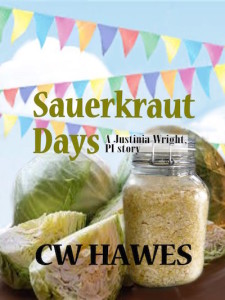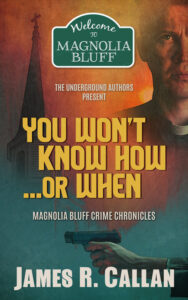The mystery genre (I’m talking about the whodunit, not the thriller) is full of marvelous tropes.
The eccentric, and perhaps flawed, detective. The bumbling Watson, the detective’s assistant. The victim, about whom we often know little or nothing. The odd array of suspects. All of which, in the right hand, make for a delightful, often humorous, suspense-filled, literary puzzle. A game of page turning Clue.
One trope that is used quite often actually is that of the detective on vacation.
The sleuth taking up a case while not in his normal environment.
Poirot in Death on the Nile comes to mind. And Rex Stout, in Some Buried Caesar, had his agoraphobic detective, Nero Wolfe, at a rural county fair.
The detective on vacation, or sick leave, or a honeymoon, is like syncopation in music: it shakes things up for both writer and reader.
We get to see our favorite detectives at work not in the environment they are used to, but in a place unfamiliar and often out of the ordinary.
The sleuth is out of his natural element, as it were, which allows us to see a different side of his, or her, personality.
Justinia Wright is something of a homebody. Yet in the short story “Sauerkraut Days”, we see her at a sauerkraut festival in small town Henderson, Minnesota, where the local sheriff asks her help in solving a murder.
Which Tina does in record time so she can participate in the sauerkraut eating contest.
Justinia Wright eating pounds of sauerkraut, who would have ever thought that?
In the newest addition to the Magnolia Bluff Crime Chronicles, You Won’t Know How… Or When by James R. Callan, Father Frank decides to take a vacation, the first in 4 years, and visit the Texas Hill Country and his friend, Father Lee, who is the priest at the Catholic Church in Magnolia Bluff.
All is well, for a few hours, at least, until Father Frank hears a man’s confession — a confession to commit murder. And the seal of the confessional pretty much prevents Father Frank from saying anything to anyone — including warning the intended victim.
Certainly no way to start a relaxing vacation sightseeing in the Texas Hill Country, is it?
I found the seal of the confessional a clever way to hamstring the amateur sleuth. To force him to use all of his wits to not only ferret out the wannabe killer, but also to protect the intended victim, while maintaining the sanctity of the sacrament and his vows.
Summer is vacation time. What better way to spend your vacation than to take a suspense-filled vicarious side trip and trip up a murderer? Come on. You know you want to.
You Won’t Know How… Or When is on pre-order right now for only 99¢. Don’t wait. The price goes up after the book launches on Friday, July 22nd. Get it now on Amazon.
And while you’re in Magnolia Bluff, take a side trip to Henderson, Minnesota and eat sauerkraut with Justinia Wright. Sauerkraut Days — only 99¢ on Amazon.
Comments are always welcome. And until next time, happy reading!
 CW Hawes is a playwright, award-winning poet, and a fictioneer, with a bestselling novel. He’s also an armchair philosopher, political theorist, social commentator, and traveler. He loves a good cup of tea and agrees that everything’s better with pizza.
CW Hawes is a playwright, award-winning poet, and a fictioneer, with a bestselling novel. He’s also an armchair philosopher, political theorist, social commentator, and traveler. He loves a good cup of tea and agrees that everything’s better with pizza.
If you enjoyed this post, please consider buying me a cup of tea. Thanks! PayPal.me/CWHawes
Share This!

